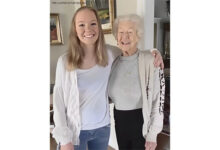HE CAME IN ALONE, ORDERED FOR TWO—AND THE WAITER SAT DOWN WITHOUT SAY A WORD
He came in alone, just as he always did.
The sun was barely up, casting long golden streaks across the dusty floor of The Lantern, the kind of roadside diner you’d only stop at if your heart needed rest more than your stomach did. I’d been working the morning shift for a few months, mostly serving regulars—truckers, retirees, and the occasional out-of-town couple passing through the edge of Missouri.
But this guy? He was different.
I noticed him the first week I started. Always the same: old plaid shirt, jeans, boots scuffed from years of living. He’d sit at the booth by the window—third from the left—order two coffees, one breakfast for himself, and one for no one.
That morning, he came in around 9:15, just after the rush. He walked past me with a nod, headed straight for his booth, and laid down two napkins.
Not one.
Two.
I was refilling sugar canisters nearby when I heard him place his order like clockwork. “I’ll have the usual,” he said, then added quietly, “and she’ll have the pancakes. No syrup. Just butter. Like always.”
There was no “she.” Not visibly, anyway.
I’m not proud to say I stared. There was something sacred in his ritual, the way he poured two cups of coffee, placed the silverware with precision, and smoothed out the second napkin with care. I’d never seen someone honor absence with such devotion.
I wasn’t his server that day, but something in my chest tightened, pulled me toward him. I walked over, cleared my throat, and said, “Can I sit with you for a minute?”
He looked up, blinking slow, as if surfacing from somewhere deep. Then he nodded once. I slid into the booth across from the empty seat.
We talked. Not much at first. Mostly about pancakes and coffee and how his wife used to flick creamers at him when the jukebox played their song. I asked how long it had been, and he said, “Today would’ve been 67 years.”
My heart ached, assuming the obvious. He wore grief like a well-worn coat.
“I keep coming back so I don’t forget how it felt to sit across from her,” he said, almost in a whisper. Then, as if remembering I was still there, he asked, “You think she still remembers, too?”
I swallowed the lump in my throat and said, “If she was loved like that? I think she remembers every day.”
He smiled, barely.
That could’ve been it. A quiet, sad story shared for no other reason than to be heard. But something about him stuck with me long after he left.
I asked my boss about him. “That’s Tom Halston,” she said. “Used to run Halston Construction down on Route 9. Big company. Made a fortune, then lost most of it in the divorce.”
“Divorce?” I asked, surprised.
“Oh yeah,” she nodded, drying a glass. “Wife left him. Moved to Florida. That was over a decade ago.”
I blinked. “So she’s not…?”
“Nope. Very much alive, last I heard.”
That revelation hit like a freight train. I sat with it all day. All those times he sat here, mourning—not death, but distance. Regret. I couldn’t shake it.
Two days later, he came in again. Same booth, same order. I brought the coffee myself and sat down without asking.
“I know she’s alive,” I said quietly. He didn’t look up, just stared into his cup like it held more answers than it did.
“I heard she’s in Florida,” I went on. “What happened, if you don’t mind me asking?”
He sighed, leaned back, and ran a hand through his thinning white hair. “I built a business from nothing,” he said. “Worked sixteen-hour days, seven days a week. Told myself I was doing it for us. For her. But I wasn’t there. Not when it mattered. Anniversary dinners, her mom’s funeral, the day her sister had a stroke—she went through all of it alone. And one day, she packed up and left. Didn’t yell. Didn’t cry. Just… left.”
He looked out the window, voice softer. “I didn’t follow. Thought she’d come back. But she didn’t.”
I sat there, stunned. It wasn’t death that kept her away—it was a life he’d chosen without her.
“She ever write?” I asked.
“Once. Said she was living in Sarasota. Found a job at a bookstore. Said not to contact her. So I didn’t.”
“But you come here every week.”
“Because I miss her,” he said. “And maybe because I don’t want to believe I lost her completely.”
Something about that broke me. I decided then I wasn’t going to let him die with a folded napkin as his only company. That night, I searched for her. I had her name—Margaret Halston—and Sarasota wasn’t a big place. It took some digging, but I found a bookstore with an employee named Maggie H. I called. Asked for her. Told her my name was Seth and that I had a friend who missed her.
There was a long silence.
Then she asked, “Does he still wear that hideous green plaid shirt?”
I smiled. “Every Thursday.”
She laughed. It was quiet, tinged with years of hurt. But it was a start.
We talked for a few minutes. She didn’t promise anything, but she asked me to give her the address of the diner. I did.
A week later, Tom came in, same as always. I gave him the usual coffee, but this time, I didn’t sit. I just nodded toward the window and said, “Booth’s all yours.”
He walked over, placed the napkins. Then paused.
She was already sitting there.
Maggie.
Same kind eyes, streaks of silver in her hair now, but still her. She looked up, half-smiling, nervous.
“I figured you might need help folding the napkin,” she said.
Tom just stood there, like he couldn’t believe she was real.
“I got tired of waiting for you to find me,” she added, softer this time.
He sat down, hands trembling.
“I’m sorry,” he said.
“I know,” she replied.
They didn’t need much more than that.
Now they come in every Thursday. Still sit at that booth. Still order the pancakes—no syrup, just butter. But now, the seat across from him isn’t empty anymore.
If you’ve ever believed love is about the big gestures or perfect timing, maybe it’s not. Maybe it’s just showing up. Even when it’s been too long. Even when you think it’s too late.
Share this if you believe in second chances. Maybe someone needs the reminder today.

